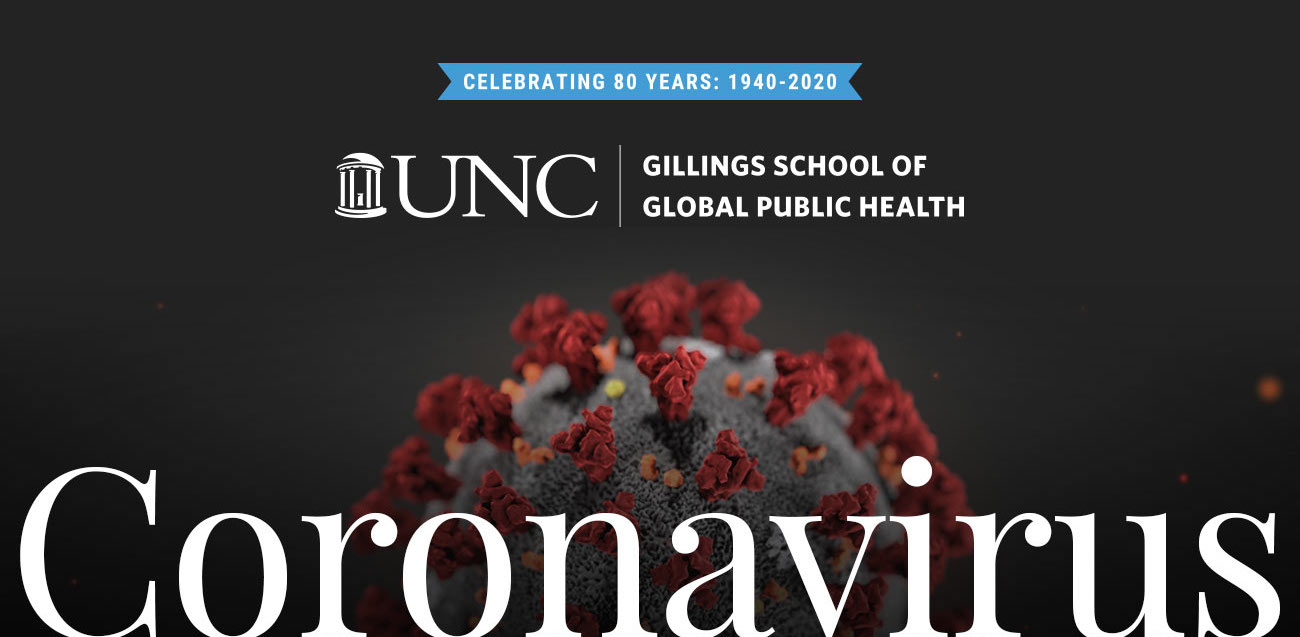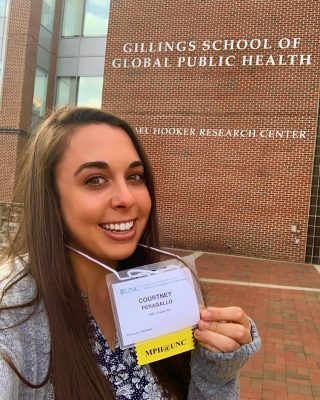The Gillings Community Responds to COVID-19: Protection for Rural Farmworkers

June 22, 2020
The challenge that COVID-19 poses across the globe epitomizes the importance of public health education and research. At the UNC Gillings School of Global Public Health, students, alumni and faculty from across disciplines are working tirelessly to put learning into action in the face of a global health crisis.
Online Master of Public Health student champions COVID-19 protections for farmworker communities in rural N.C.

Courtney Peragallo shows off her name tag in front of Michael Hooker Research Center.
Graduate student Courtney Peragallo began her pursuit of a Master of Public Health degree at the Gillings School in January when she earned an MPH@UNC fellowship to study leadership in practice, but her work in global health started during her undergraduate years, most notably when she took an internship related to her double-major of Spanish and public health.
That internship gave her the opportunity to work with Spanish-speaking farmworkers at Manos Unidas, a nonprofit organization in the North Carolina Farmworker Health Program (NCFHP) which provides health services, resources and bilingual education to migrant and seasonal farmworkers and their families across the state through a network of outreach and health care providers. It was during this internship that Hurricane Florence devastated the service area of farmworkers, and Peragallo saw firsthand just how necessary public health competencies were in order to mobilize marginalized communities during a crisis.
Once the internship ended, Peragallo was tapped to serve as a project coordinator with the NC Office of Rural Health as part of a disaster preparedness initiative for the farmworker community. Because the NCFHP is housed within the Office or Rural Health at the North Carolina Department of Health and Human Services, the role allowed her to advocate to state and local leaders on behalf of a population that has historically seen a lack of representation in scientific studies.
“I was selected for this role because of the trust I built in these communities while at the same time knowing how to apply public health practice,” Peragallo says. “Part of the challenge is that most researchers and public health professionals are not well-integrated into these communities. They face barriers such as lack of cultural humility and lack of trust within the target population. This results in unsustainable interventions that do not promote long-term change.”
In her current role, Peragallo has been working to access grant funding for projects that can protect and support the farmworker community during the coronavirus outbreak. This outreach includes providing supplies and educational resources specific to COVID-19 prevention in Spanish and indigenous languages like Mixteco and Haitian Creole. These indigenous populations are at a disproportionately higher risk of mortality, due in part to the prevalence of diabetes, hypertension and other chronic conditions that can increase complications from COVID-19.
She has also assisted in providing frontline responders in rural areas with personal protective equipment so that outreach staff can continue protecting themselves and their community at mobile clinics located in farmworker campsites. With help from these mobile clinics, patients can self-monitor their symptoms with the medical equipment they receive, such as blood pressure cuffs, pulse oximeters and infrared forehead thermometers. Through this outreach, farmworkers are also provided kits that contain supplies and education on how to properly make and use disinfectant that can be shared across large populations of workers.
For Peragallo, the COVID-19 shutdowns have made transitioning her work into a virtual environment a challenge.
“Face-to-face communication and non-verbal cues are critical for establishing trust,” she explains, “especially in first interactions. It’s an important part of applying public health principles in a culturally sensitive way. Outreach staff members are vital for farmworker populations, since they are most likely the first point of contact in a crisis, whether it be a domestic violence dispute, mental health episode, the COVID-19 pandemic or natural disasters.”
While farmworkers are considered essential to the economy – particularly in North Carolina, which ranks among the top agricultural producing states in the country – their health care needs are disproportionately overlooked. Peragallo believes it is the responsibility of public health professionals to be more inclusive by refining their cultural competency skills to better serve and protect vulnerable populations such as these.
“I think that the more leaders who are able to speak up and stand up for the farmworker community, the more change we will see,” she says. “Farmworkers must be given a voice. The fear and lack of trust ingrained within this population makes it less likely that they will be heard. Public health professionals have a duty to represent them. We must advocate and demonstrate the importance of protecting the vulnerable.”
See more general information about COVID-19 at the Gillings School’s Coronavirus Information Portal.
Read more about how Gillings students and alumni are responding to the COVID-19 pandemic in our previous feature.
Find a roundup of all our experts’ coronavirus-related media outreach in this Twitter moment.
Contact the UNC Gillings School of Global Public Health communications team at sphcomm@unc.edu.
